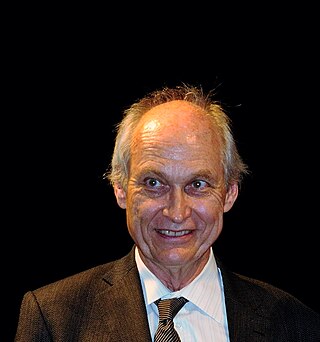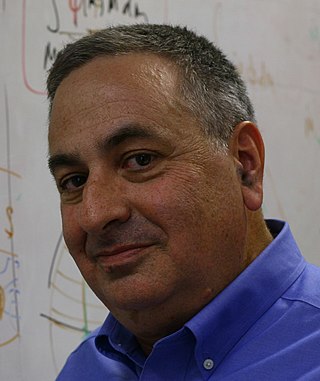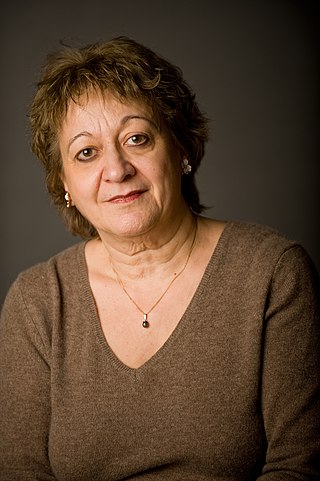Related Research Articles

Michael S. Turner is an American theoretical cosmologist who coined the term dark energy in 1998. He is the Rauner Distinguished Service Professor Emeritus of Physics at the University of Chicago, having previously served as the Bruce V. & Diana M. Rauner Distinguished Service Professor, and as the assistant director for Mathematical and Physical Sciences for the US National Science Foundation.

Margaret J. Geller is an American astrophysicist at the Center for Astrophysics | Harvard & Smithsonian. Her work has included pioneering maps of the nearby universe, studies of the relationship between galaxies and their environment, and the development and application of methods for measuring the distribution of matter in the universe.

Robert P. Kirshner is an American astronomer, Chief Program Officer for Science for the Gordon and Betty Moore Foundation, and the Clownes Research Professor of Science at Harvard University. Kirshner has worked in several areas of astronomy including the physics of supernovae, supernova remnants, the large-scale structure of the cosmos, and the use of supernovae to measure the expansion of the universe.

Avishai Dekel is a professor of physics at the Hebrew University of Jerusalem, Israel, holding the Andre Aisenstadt Chair of Theoretical Physics. His primary research interests are in astrophysics and cosmology.

Charles L. Bennett is an American observational astrophysicist. He is a Bloomberg Distinguished Professor, the Alumni Centennial Professor of Physics and Astronomy and a Gilman Scholar at Johns Hopkins University. He is the Principal Investigator of NASA's highly successful Wilkinson Microwave Anisotropy Probe (WMAP).

Wendy Laurel Freedman is a Canadian-American astronomer, best known for her measurement of the Hubble constant, and as director of the Carnegie Observatories in Pasadena, California, and Las Campanas, Chile. She is now the John & Marion Sullivan University Professor of Astronomy and Astrophysics at the University of Chicago. Her principal research interests are in observational cosmology, focusing on measuring both the current and past expansion rates of the universe, and on characterizing the nature of dark energy.
Marc Kamionkowski is an American theoretical physicist and currently the William R. Kenan, Jr. Professor of Physics and Astronomy at Johns Hopkins University. His research interests include particle physics, dark matter, inflation, the cosmic microwave background and gravitational waves.
Alice Eve Shapley is a professor at the University of California, Los Angeles (UCLA) in the Department of Physics and Astronomy. She was one of the discoverers of the spiral galaxy BX442. Through her time at University of California, Los Angeles (UCLA) she has taught Nature of the Universe, Black Holes and Cosmic Catastrophes, Cosmology: Our Changing Concepts of the Universe, Galaxies, Scientific Writing, AGNs, Galaxies, *and* Writing, and The Formation and Evolution of Galaxies and the IGM. Shapley has committed herself too over a two decades of research and publication in the interest of physics and astronomy.

Licia Verde is an Italian cosmologist and theoretical physicist and currently ICREA Professor of Physics and Astronomy at the University of Barcelona. Her research interests include large-scale structure, dark matter, dark energy, inflation and the cosmic microwave background.

Chryssa Kouveliotou is a Greek astrophysicist. She is a professor at George Washington University and a retired senior technologist in high-energy astrophysics at NASA's Marshall Space Flight Center in Huntsville, Alabama.
Suzanne T. Staggs is an American physicist who is currently the Henry DeWolf Smyth Professor of Physics at Princeton University. Staggs has led the development of numerous cosmic microwave background experiments and is currently the principal investigator (PI) of the Atacama Cosmology Telescope (ACT) and founding member of the Simons Observatory (SO). In 2020, Staggs was elected into the National Academy of Sciences.
Risa H. Wechsler is an American cosmological physicist, Professor of Physics at Stanford University, and Professor of Particle Physics and Astrophysics at SLAC National Accelerator Laboratory. She is the director of the Kavli Institute for Particle Astrophysics and Cosmology.

Hiranya Vajramani Peiris is a British astrophysicist at University College London and Stockholm University, best known for her work on the cosmic microwave background radiation. She was one of 27 scientists who received the Breakthrough Prize in Fundamental Physics in 2018 for their "detailed maps of the early universe."

Angela Villela Olinto is an astroparticle physicist and the Albert A. Michelson Distinguished Service Professor at the University of Chicago as well as the dean of the Physical Sciences Division. Her current work is focused on understanding the origin of high-energy cosmic rays, gamma rays, and neutrinos.
Hanna Reisler is an Israeli-American Professor of Chemistry at the University of Southern California. She is interested in the reaction dynamics of molecules and free radicals, as well as the photodissociation in the gas phase. Reisler established the University of Southern California Women In Science and Engineering (WISE) program.
Abigail Goodhue Vieregg is a professor of physics at the Enrico Fermi Institute and Kavli Institute of Cosmology, University of Chicago, specializing in neutrino astrophysics and cosmology. Her work focuses on cosmic high-energy neutrinos and mapping the cosmic microwave background.
Joshua A. Frieman is a theoretical astrophysicist who lives and works in the United States. He is a senior scientist at Fermilab and a professor of astronomy and astrophysics at the University of Chicago. Frieman is known for his work studying dark energy and cosmology, and he co-founded the Dark Energy Survey experiment. He was elected a member of the National Academy of Sciences in 2022.
Cora Dvorkin is an Argentine physicist, who is a professor at the physics department at Harvard University. Dvorkin is a theoretical cosmologist. Her areas of research are: the nature of dark matter, neutrinos and other light relics, and the physics of the early universe. Dvorkin is the Harvard Representative at the newly NSF-funded Institute for Artificial Intelligence and Fundamental Interactions (IAIFI)'s Board. In 2022, she was voted “favorite professor” by the Harvard senior Class of 2023. She has been awarded the 2019 DOE Early Career award and has been named the "2018 Scientist of the year" by the Harvard Foundation for "Salient Contributions to Physics, Cosmology and STEM Education". She has also been awarded a Radcliffe Institute Fellowship and a Shutzer Professorship at the Radcliffe Institute. In 2018 she was awarded a Star Family Challenge prize for Promising Scientific Research, which supports high-risk, high-impact scientific research at Harvard. In 2020, Dvorkin gave a talk on machine learning applied to the search for dark matter as part of the TEDx Río de la Plata event.
Vasiliki Pavlidou is a Greek astrophysicst and Full Professor in the Department of Physics at the University of Crete and an Affiliated Faculty at the Institute of Astrophysics - Foundation for Research & Technology - Helas. Since July 2023 she serves as an associate editor in the peer-reviewed scientific journal Astronomy & Astrophysics Her research interests focus on cosmology, high energy physics and radio astronomy.

Nicolás Yunes is an Argentinian theoretical physicist who is a professor at the University of Illinois Urbana-Champaign and the founding director of the Illinois Center for Advanced Studies of the Universe (ICASU). He is particularly interested in extreme gravity, gravitational waves, and compact binaries.
References
- ↑ Walker, Jack (2016-05-25). "Amber Miller named dean of Dornsife". Daily Trojan. Retrieved 2022-01-24.
- 1 2 "Amber Miller > USC Dana and David Dornsife College of Letters, Arts and Sciences". dornsife.usc.edu. Retrieved 2022-01-24.
- ↑ "Search Results". STScI.edu. Retrieved 2022-01-24.
- ↑ "NASA/ADS". ui.adsabs.harvard.edu. Retrieved 2022-01-24.
- ↑ "Astrophysics". arxiv.org. Retrieved 2022-01-24.
- ↑ Miller, Amber (November 2000). "A Measurement of the Cosmic Wave Background from the High Chilean Andes" (PDF). USC Dornsife.
- ↑ "Awards and Honors | Faculty of Arts and Sciences". fas.columbia.edu. Retrieved 2022-01-24.
- ↑ "APS Fellow Archive". American Physical Society. Retrieved March 5, 2022.